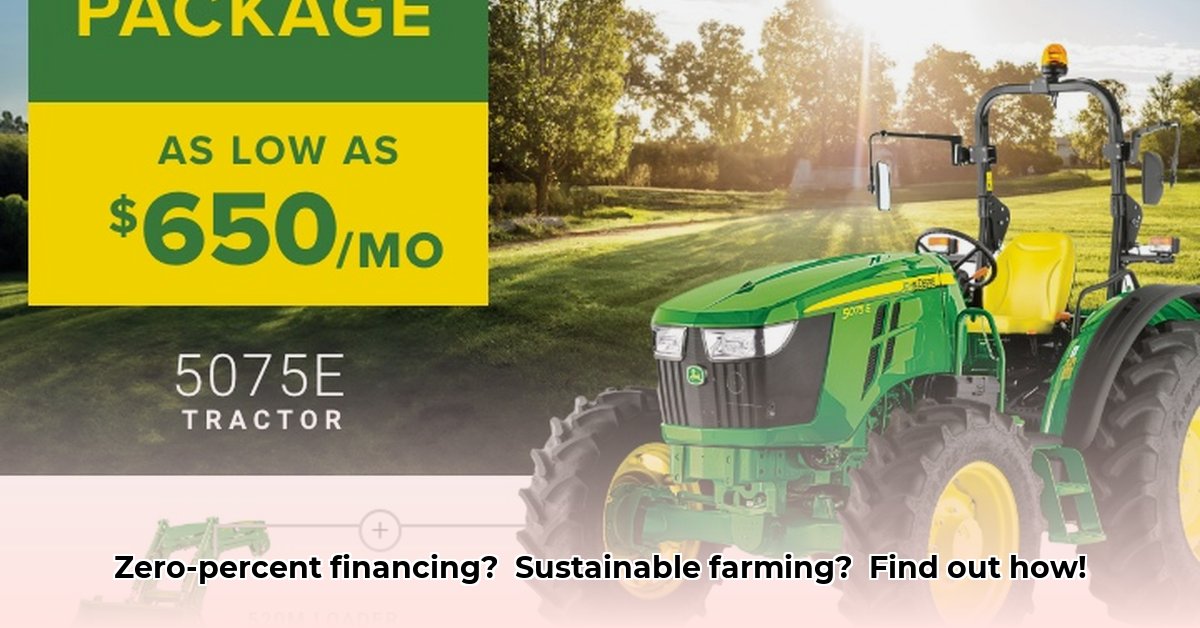
Riding into a Sustainable Future with 0% Financing
Jedidiah, a small rancher in Montana, faced a familiar struggle: his aging tractor was failing, threatening his livelihood. Repair costs were mounting, and the thought of buying new equipment felt overwhelming. Then he discovered John Deere's "Cowboy Tractor" deals – 50-75 horsepower compact utility tractors (CUTs) with 0% APR financing. Jedidiah's story isn't unique; it highlights the transformative potential of accessible agricultural technology. This article explores the Cowboy Tractor, examining its benefits, sustainability implications, and actionable steps for farmers, John Deere, and environmental groups. For more on farm equipment depreciation, see this helpful resource.
The Compact Utility Tractor Market: A Booming Sector
The compact utility tractor (CUT) market is experiencing significant growth, driven by the increasing number of small-scale farms and ranches. These farms need efficient, affordable, and versatile equipment. The 50-75 horsepower range is particularly appealing, offering a powerful yet maneuverable solution. John Deere's 0% financing options are a game changer, making these tractors more accessible than ever before. Isn't this financial incentive a compelling reason for farmers to upgrade their equipment?
The Cowboy Tractor: A Deep Dive into Features and Benefits
John Deere's Cowboy Tractor package is more than just clever branding; it represents a comprehensive solution for smaller operations. Key advantages include:
- Enhanced Affordability: The 0% APR financing significantly lowers the barrier to entry, making tractor ownership a realistic possibility for more farmers. This accessibility boosts productivity and reduces reliance on outdated or unreliable equipment.
- Ease of Use: CUTs are designed for user-friendliness, ideal for farmers with limited tractor experience. Their compact size allows easy maneuverability in tighter spaces.
- Remarkable Versatility: A wide array of attachments, from tillers and loaders to mowers, makes these tractors adaptable to countless tasks, optimizing efficiency and cost-effectiveness.
- Increased Productivity: A reliable, powerful tractor minimizes downtime, leading to significant improvements in efficiency and profitability. This translates to more time focusing on other aspects of the farm.
Sustainability Considerations: An Ongoing Conversation
While the Cowboy Tractor offers many benefits, a thorough assessment of its environmental impact is crucial. Comprehensive lifecycle assessments (LCAs) are needed to fully understand its fuel efficiency, emissions, and overall environmental footprint. Currently, complete data is limited; however, John Deere's commitment to fuel efficiency and durable materials positions this tractor as a step towards more sustainable agriculture. This is an important point to consider when upgrading equipment. Are long-term environmental impacts a priority for you?
Actionable Insights: A Collaborative Approach
Effective action requires a collaborative effort between farmers, John Deere, and environmental groups:
For Farmers and Ranchers:
- Thoroughly Investigate Financing Options: Compare the long-term savings of 0% APR financing against the initial investment. Does it align with your budget?
- Conduct a Return on Investment (ROI) Analysis: Carefully weigh the benefits (increased efficiency, reduced downtime) against the cost of the Cowboy Tractor. Does it make financial sense for your operation?
- Embrace Advanced Technologies: Explore options like GPS-guided systems and auto-steer to optimize efficiency and minimize environmental impact. These technologies can significantly enhance sustainability.
For John Deere and Dealers:
- Enhance Financial Accessibility: Continue developing and expanding affordable financing programs to broaden market reach. This will help support farmers of various scales.
- Invest in Sustainability R&D: Prioritize research into fuel efficiency, alternative fuels, and more sustainable materials. Transparency in these efforts will foster trust with consumers.
- Implement Data Tracking: Collect and analyze data on tractor usage to better understand their environmental impact. This data will help create a more sustainable trajectory.
For Environmental Groups:
- Advocate for Standardized LCAs: Promote the adoption of industry-wide standards for comprehensive lifecycle assessments of agricultural equipment. This crucial information will help guide consumers.
- Promote Sustainable Practices: Support broader sustainable practices. Individual equipment changes are but one piece of the puzzle.
- Direct Funding Towards Research: Invest in research on sustainable alternatives and environmentally friendly manufacturing processes.
Conclusion: A Promising Step Towards a Sustainable Future
The Cowboy Tractor offers a compelling solution for small-scale farmers and ranchers, particularly with its attractive financing. Jedidiah’s success story serves as a compelling testament to this. However, comprehensive lifecycle assessments are paramount to understanding its long-term sustainability. A collaborative approach, involving farmers, John Deere, and environmental groups, is crucial for achieving a truly sustainable agricultural future. The Cowboy Tractor represents a promising step, but continuous improvement and research are vital for driving progress.
Call to Action:
Contact your local John Deere dealer to learn more about the Cowboy Tractor and its financing options. Let's work together to build a more sustainable future for agriculture.